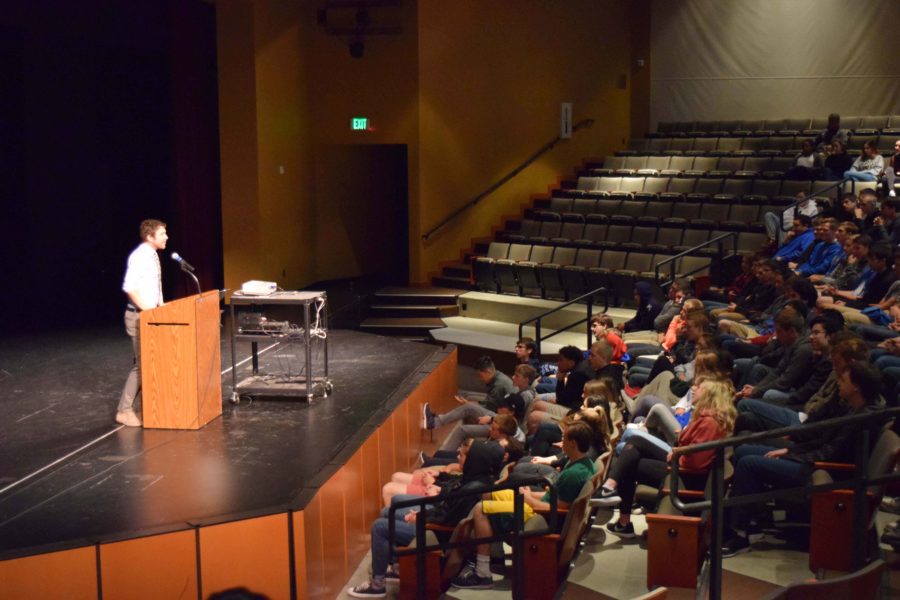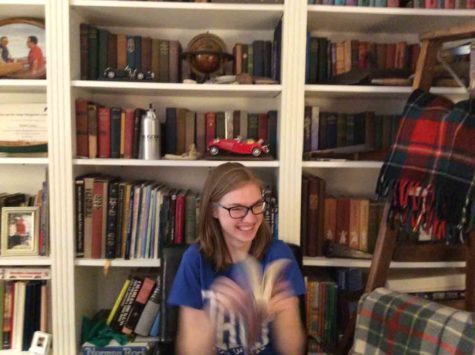An Interview With Jeff Hobbs, Author of The Short and Tragic Life of Robert Peace
Author Jeff Hobbs spoke to Seattle Prep students about his book The Short and Tragic Life of Robert Peace
June 3, 2016
The biographical work, The Short and Tragic Life of Robert Peace, tells the story of “a brilliant young man who left Newark for the Ivy League.” It is about Robert Peace, a man born in the unstable and criminally active streets of Newark and a student of the Ivy League at Yale, forced to constantly bounce back and forth between the two, never quite fitting in one place due to association with the other. Peace had an incredibly strong mother who raised him independently and acquired a good education for him so he could go to Yale. His father had been arrested for murder, leaving Peace to fill “The Man” role in the house. Then he went to St. Benedict’s Prep school, playing water polo, trying to find a way to help his father, and working various jobs to help his mother financially on top of regular high school activities. Eventually Peace won the Presidential Award upon graduation and received a full ride to Yale as a gift from a St. Benedict’s alumnus.
The book is about the impossible task of trying to get ahead in life without ever asking for help. It is about how friendships, and family, and community shape a person’s decisions, for better or for worse, and how people can experience the same moment in different ways. It is about leadership. And pot. It is about one man who constantly carried his hardships within him while always striving to be there to help others deal with their hardships.
This book was written by Peace’s college roommate at Yale, Jeff Hobbs. Hobbs connected with many members of Peace’s vast network of friends after his death. Through these connections, Hobbs realized Peace’s story was the story he wanted to tell, after seeing how Peace managed to bring so many different people together. The Panther was fortunate enough to be able to sit down with the author and ask him questions about The Short and Tragic Life of Robert Peace.
Emma Cooney: What made you want to write the book in the first place?
Jeff Hobbs: A community of people formed and [the book] came out of that. I had a lot of support which helped with any sort of self doubt or anxiety that comes with doing something like this. And obviously his mother was supportive. I guess it was when I started learning how compartmentalized his life was, which became apparent very early on. It was really troubling also, and really powerful. It also had to do with the narratives we create around a story like this, which at a glance is easy to dismiss. But it did not take very long, getting in to it, to feel how much emotion was packed, even into the bad choices, like the larger endeavor to deal drugs that got him killed.
EC: What prompted the decision to write this in a form similar to a novel?
JH: Partly because I am a novelist, I had never done any nonfiction or research or even read much nonfiction before starting. I think I mentioned I didn’t know what I was doing. (smiles) But it really had more to do with the vividness of which people I talked to remembered him, kind of the level of detail. It speaks a lot to Rob and what kind of a friend he was. The way people remembered him was very novelistic…It seemed like the best way to tell the story was the way I was learning it.
EC: How did you begin reaching out to people? How did you get them to recall exact conversations and details?
JH: Part of it has to do with the imprint Rob made on various people, and on me. He also had a very distinctive voice, if we are talking about memory. The way he talked and told stories is just more memorable, than me, no one’s going to remember me that way, for sure. I was very nervous reaching out to a lot of people because of the way I look, and I inhabited a very specific part of Rob’s life. I feared not just skepticism but anger, maybe. And I did experience a tiny bit of that but really people were very generous in letting me into their homes and their memories and any sort of walls that you would think would be between us either weren’t or they came down really fast through laughing. People just like to talk about things that they love and that is the way a lot of people felt for Rob.
EC: How do you think your worldview shaped the point of view of the story?
JH: I am not sure I was very conscious of that up to a certain point. Once it became necessary to put myself in the story, which I was not comfortable with, and I am still not, I could not really figure out a way around it. And once I couldn’t [figure out a way around it], I had to figure out a way to commit to it. Hopefully it brings forward the fact that we don’t experience each moment the same way, even if it feels like we’re being “all good” and grounded and sensitive, it is not always the case.
EC: What was it like to research parts of the story that even Peace did not know?
JH: Especially when it came to his father, that is when it really did feel like an invasion of privacy and an overstepping, still does…It is really sad to learn these things, and sad to think that for whatever reason these were things he kept so contained, and I mean the titular tragedy for me is that you have this guy who was just beloved, surrounded by dozens and dozens of people who would want nothing more than to help him out in whatever capacity they could, and he would not let them.
EC: Did it take a while to realize that there was more to Peace than the way he first appeared?
JH: I do remember the girl Zina who he dated…I think it was being on the fringe of what seemed like a relationship that was mature but also chaotic, and sort of a very adult kind of chaos that I was not familiar with, was probably when. These are the things that are really hard to recollect, changes in an emotional relationship, it is a lot harder to pinpoint that than conversations. Even that first moment of seeing the way his mom was, in our room, and even being an idiot 18 year old, you could just see that there was something there that was pretty heavy, because of the way she was so reserved.
EC: When you learned about all of his hardships, were you more confused about how he managed to hide his feelings so well, or did his actions make more sense because you understood what went behind making them?
JH: I think the former, that he had this ability to project what he wanted to project. Once in a while there would be sort of a fissure when you realized he was angry about something, but again he could make it really uncomfortable to ask about that.
EC: You say in your acknowledgements, David Black taught you, “…how to ask the questions that haven’t been asked and are thus the easiest to avoid asking.” How important was this idea to you when you sat down to write this book? How should people think about asking questions we have been avoiding?
JH: Being uncomfortable is usually when you learn or grow the most. In the process of the research for this, that was something I learned over time. It sounds manipulative but it is a very fine balance between not being aggressive or exploitative, especially if you are talking about race and class and these difficult things, to not be afraid to ask straight up what that is like. There is a way to do that while being up front about it. You can’t act like you know what is going on. That is what reporting is. How are you supposed to learn anything if you can’t ask? Have faith that people want to talk about what they love and what fascinates them. If you can listen the right way.
EC: How did it feel to discover that your words and your friend’s story were gaining popularity? And what would you tell people who read this to be aware of?
JH: It was stressful, definitely. I learned how to own that, particularly participating directly in an apparatus in which the majority of stories in this country are told by overeducated white males. I have to own that and my intentions are not clear to everybody, but most people seem to get that at the bottom of it it comes out of love and earnestness. The biggest responsibility of writing this kind of nonfiction is what you left out, or what you failed to find when you had the chance. That kind of permanence is troublesome but it is just the nature of storytelling…I have to, at a certain point, have some confidence, which is hard to achieve, that I tried to do a positive thing that Rob would ultimately be glad about.
EC: How was this book different from the other novels you wrote?
JH: It was so much harder. I like sitting in the garage all day by myself with my dog so the prospect of being out in the world in places where I was not necessarily welcome was really powerful and I got the bug for engaging with people. I like to think that it is more mature than stuff I had done before. Your sensibilities change a lot in your twenties, early thirties. In that time I had two kids.
From the insight gained in the conversation with Jeff Hobbs and lessons from Peace Peace’s life that he was able to express so beautifully in his book, The Short and Tragic Life of Robert Peace, Prep students can conclude that “…it’s messy being a person, and having a consciousness, and having values, often conflicting values.” And it is messy telling the life story of another person who is not around to explain his consciousness and his values. Often, that task requires being uncomfortable and asking difficult questions. The only way to truly understand another person is to be open to hearing about their experience. As a final thought, The Panther leaves you with the same message Jeff Hobbs gave to his presentation to the juniors. Ask difficult questions, especially if that question is, “can I have some help?” be a little uncomfortable sometimes, and take the time to get to know your classmates, because understanding can only be gained through reaching out to people.



